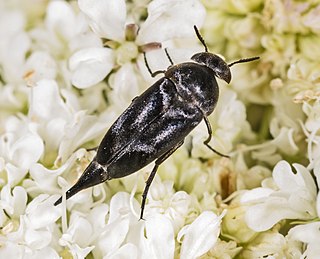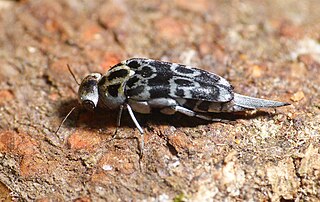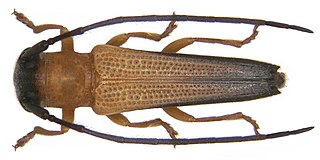Related Research Articles

The Lymexylidae, also known as ship-timber beetles, are a family of wood-boring beetles. Lymexylidae belong to the suborder Polyphaga and are the sole member of the superfamily Lymexyloidea.

The Mordellidae are a family of beetles commonly known as tumbling flower beetles for the typical irregular movements they make when escaping predators, or as pintail beetles due to their abdominal tip which aids them in performing these tumbling movements. Worldwide, there are about 1500 species.

Attagenus is a genus of beetles. This genus is found in tropical Africa, the Palearctic including Europe, the Near East, the Nearctic, North Africa and East Asia. There are nearly 200 species. The genus has existed for at least 99 million years, with fossils known from the Cenomanian aged Burmese amber and Turonian aged New Jersey amber.

Mordella is the type genus of the tumbling flower beetle family (Mordellidae), its subfamily Mordellinae and the tribe Mordellini. It is widely distributed in the Holarctic and adjacent regions. The larvae are primarily dead wood borers.
Elateroides is a genus of rarely found beetles in the family Lymexylidae, containing the following species:

Atractocerus is a genus of beetles in the family Lymexylidae. The most recent revision of the family treats several small or monotypic genera as synonyms of Atractocerus, though some authors continue to use the older generic names (e.g.).

Lymexylon is a genus of beetles in the family Lymexylidae, containing the following species:
Melittomma is a genus of beetles in the family Lymexylidae, containing the following species:
Protomelittomma insulare is a species of beetle in the family Lymexylidae, the only species in the genus Protomelittomma.

Glipa is a genus of beetles in the family Mordellidae, containing the following species:

Tomoxia is a genus of beetles in the family Mordellidae, containing the following species:

Mordellistena is a genus of beetles in the family Mordellidae, containing the following species:

Mordellinae is a subfamily of beetles commonly known as tumbling flower beetles for the typical irregular movements they make when escaping predators, or as pintail beetles due to their abdominal tip which aids them in performing these tumbling movements.

Saperdini is a tribe of longhorn beetles of the subfamily Lamiinae.
Cylindrepomus is a genus of longhorn beetles of the subfamily Lamiinae, containing the following species:

Mesosa is a genus of longhorn beetles of the subfamily Lamiinae, containing the following species:

Nupserha is a genus of longhorn beetles of the subfamily Lamiinae, containing the following species:
Serixia is a genus of longhorn beetles of the subfamily Lamiinae, containing the following species:

Tillinae is a subfamily of beetles in the family Cleridae, the checkered beetles.

Telegeusinae is a small subfamily of beetles in the family Omethidae recognizable by enlarged palpi found in males. Though relatively rare, males are sometimes found in large numbers in black light traps. Females are not known in this group, but it is theorized that females are larviform as found in many closely related taxa.
References
- ↑ "Lymexylidae Species List". Joel Hallan’s Biology Catalog. Texas A&M University. Archived from the original on 23 October 2012. Retrieved 17 May 2012.